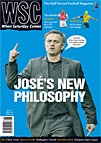 Tottenham fans seemed to be enjoying their trip to Andalusia when the policing suddenly turned nasty. Steve Davies was there and tries to understand why the situation took a turn for the worse
Tottenham fans seemed to be enjoying their trip to Andalusia when the policing suddenly turned nasty. Steve Davies was there and tries to understand why the situation took a turn for the worse
“Why are the police hitting people who haven’t done anything?” asked my seven-year-old son, who I had taken to Seville to see Spurs.
Both the city of Seville and Sevilla FC elected to deal with their concerns about football clashing with Holy Week positively. A fanzone, set up on a concrete concourse and complete with beer and Chas & Dave songs, was a brave effort to create a little bit of N17 in Andalusia. Despite this, most of the 4,000 Spurs supporters chose to go into the city centre.
The atmosphere was relaxed; supporters sat in cafes and wandered about without gathering in large groups or showing any signs of rowdiness. As we got to the ground, supporters of both teams mingled without antagonism. The same was true inside the stadium, despite being separated by only a piece of tape. Then midway through the first half the police, all dressed up for a riot, started moving into the Spurs supporters in the section below us, bashing those nearest to them with long batons.
The most common explanation I heard was that it started when a supporter had tried to go to the toilet and had been pushed away. Supporters did not fight back but they did stand their ground, expressing bewilderment at the treatment they were receiving. The battering went on and inflammatory events such as the striking of a disabled fan saw the mood turn rapidly to anger. A couple of seats were thrown from the back towards the police. The police then came up to our section, got shouted at by angry fans, hit a few and retreated. It was bizarre.
As half-time approached we were on the verge of a riot. Supporters were not prepared to sit and watch other fans get bashed up by cowards with sticks. The situation, however, was saved by the stewards Tottenham had brought with them, who persuaded the police to withdraw. From that point on there were no problems and both groups of supporters stood next to each other again.
Why did this happen? The policing was not organised to prevent flashpoints in the (perhaps depressingly) sophisticated manner we are used to at British grounds. It was reactive. Rather than controlling the situation, it was about having police with sticks there to restore order if necessary. The police did not look as if they believed they were in control – some were frightened, some were crazy and some had to be pulled back by their colleagues. Inevitably, if the police do not feel in control they overreact, as they fear being overwhelmed themselves. Chaos also means that those in power with violent tendencies are presented with an opportunity to exercise them.
Some of the Spanish police had perhaps been excited by scenes from Rome the night before, where Manchester United fans had been attacked. This was also perhaps driven by a concept of the British hooligan.
There are broader cultural reasons, too. British visitors to Spain and Italy would tend to see those countries as bastions of civilised lifestyles where nightlife is free of our binge-drinking culture. The reality is, of course, more complicated. Within living memory, both have had authoritarian governments under which the police were used to employing force and their targets used to submitting to it. Even in democratic Spain and Italy some of that culture remains. Police in those countries still use force more readily and still expect those on the receiving end to submit or run away.
Anger, bewilderment and belligerence were the reactions of British supporters not used to being treated in that way, or at least coming from a country where bad conduct by the police is challenged. Until we reconcile that cultural difference – obviously one that would be better solved by Spanish and Italian police hitting people less, rather than by British supporters getting used to it – we will continue to have problems. The reaction of the media in the UK gives some hope. Eyewitness reports by supporters on mobiles managed to get across what was really happening and there now seems to be an end to the assumption that the supporters must be at fault.
We need more than that, though, perhaps in terms of a strategy from the FA and the government that changes the way law‑abiding British supporters are treated abroad. The only initiative so far to move from talk to action is from fans. This is the co-ordination of legal action against the Italian police by Man Utd fan group IMUSA. That is a welcome step towards the goal of ensuring that more supporters do not have to pose the question that my son asked.
From WSC 244 June 2007. What was happening this month